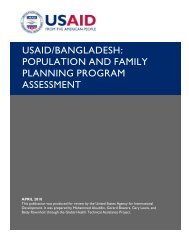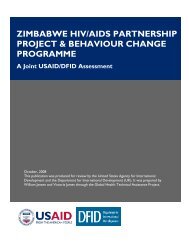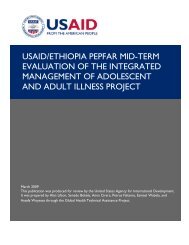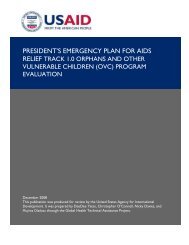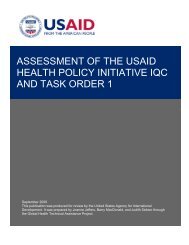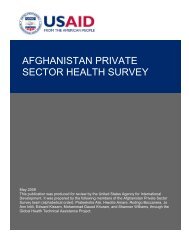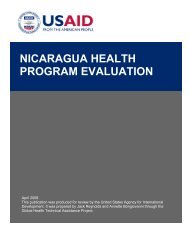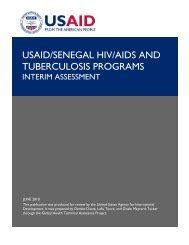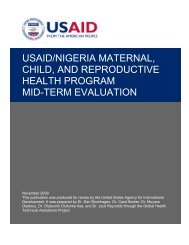Evaluation of the Tuberculosis Control Assistance Program (TB CAP)
Evaluation of the Tuberculosis Control Assistance Program (TB CAP)
Evaluation of the Tuberculosis Control Assistance Program (TB CAP)
You also want an ePaper? Increase the reach of your titles
YUMPU automatically turns print PDFs into web optimized ePapers that Google loves.
while providing for annual adjustments <strong>of</strong> activities and resourcing based on needs, progress, andfunds. Longer-term planning with <strong>the</strong> anticipation <strong>of</strong> funds would make country <strong>TB</strong> control measuresmore sound and help stimulate investment in <strong>the</strong> technical capacity needed to meet current andprojected country demand.B. STRATEGY AND GOVERNANCEThe <strong>TB</strong> <strong>CAP</strong> Board <strong>of</strong> Directors is responsible for developing policies, strategic planning, and budgeting.It also gives direction to program implementation and monitors its progress and quality. The boardresolves issues and determines ways to improve core, regional, and country-funded activities. 5 The PMUis responsible for overseeing day-to-day management <strong>of</strong> all projects. It must facilitate <strong>the</strong> drafting andapproval <strong>of</strong> plans for <strong>TB</strong> <strong>CAP</strong> work, transfer funds to reimburse partners for work performed, andmonitor and report on activities and cumulative impact. In practice, however, <strong>the</strong>se roles are not strictly orconsistently applied. The work <strong>of</strong> <strong>the</strong> board puts too much emphasis on management and not enough timeand effort on medium- to long-term strategic planning.Members <strong>of</strong> <strong>the</strong> board are well qualified to make strategic program decisions, but are <strong>of</strong>ten asked to makeday-to-day program management decisions, which would be better left to <strong>the</strong> PMU. For a variety <strong>of</strong>reasons (such as competing interests for <strong>the</strong> short time that board members have toge<strong>the</strong>r, a lack <strong>of</strong>prompting and preparation <strong>of</strong> strategic issues for discussion, or a failure to assert its role as a strategicallyfocused body), this strength is not being used optimally. For instance, <strong>the</strong> following issues would ideallybe addressed by <strong>the</strong> board:<strong>TB</strong> <strong>CAP</strong> support in countries would be more efficient and have more impact if it were better alignedwith <strong>the</strong> activities <strong>of</strong> <strong>the</strong> Global Fund to Fight AIDS, <strong>TB</strong> and Malaria (Global Fund) and withPEPFAR.The deterioration <strong>of</strong> primary health care services and facilities in a number <strong>of</strong> countries in recentyears makes it more difficult to provide quality <strong>TB</strong> diagnostic and treatment services at <strong>the</strong> peripheralservice level.Concerns about increased drug resistance and <strong>TB</strong>/HIV coinfection have led governments and <strong>the</strong>international community to give unbalanced emphasis to <strong>the</strong>se problems at <strong>the</strong> expense <strong>of</strong>streng<strong>the</strong>ning community and primary peripheral health service-based DOT.There are areas where <strong>TB</strong> <strong>CAP</strong> needs to increase its awareness and competence, especially advocacy,information management and dissemination, quality assurance, and <strong>the</strong> best indicators <strong>of</strong> <strong>TB</strong> control.Widespread dissemination and uptake <strong>of</strong> products and experience gained from <strong>TB</strong> <strong>CAP</strong> activitiesrequires an effective marketing strategy.Discussions with NTPs and partners and field observations identified a strongly felt need for <strong>TB</strong> <strong>CAP</strong>to support field operations research and use locally available data. The USAID TREAT <strong>TB</strong> project<strong>of</strong>fers a significant mutual opportunity. However, it will be very important that <strong>the</strong> two projects,within <strong>the</strong>ir respective roles, are carefully coordinated to work synergistically.Although <strong>the</strong> board is responsible 6 for monitoring <strong>the</strong> progress <strong>of</strong> program implementation andquality, it has no clear mechanism for objectively evaluating and addressing underperformance.5 <strong>TB</strong> <strong>CAP</strong> Operational Manual, Version January 20096 ibid6 EVALUATION OF THE TUBERCULOSIS CONTROL ASSISTANCE PROGRAM (<strong>TB</strong> <strong>CAP</strong>)



